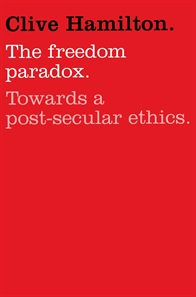ethics
Why Happiness Has Nothing To Do With Morality
Let us, today, stop using happiness – or its analogue pleasure – as the end of morality. To think such is to put the cart firmly before the horse.
Let us, today, stop using happiness – or its analogue pleasure – as the end of morality. To think such is to put the cart firmly before the horse.
This is the End of the Beginning of the New Synthesis, the path hacked through the jungle of confusion to a new destination, and the Beginning of the Middle of the actual hard work of mapping the complex terrain of our moral faculty.
I’ve finally had an opportunity to read through the challenge to Jon Haidt’s Moral Foundations Theory by Craig Anderson, of the University of Wisconsin, and I’ve found there are differences with my own similar challenge. Craig suggests that truth/right-belief could be considered as a sixth moral foundation: The central aspect Read more…
“The secret of happiness is freedom. The secret of freedom is courage.” – Thucydides
Why, after two centuries of unprecedented expansion of wealth and liberty in the Western world, are so many of us left feeling unfulfilled? Were not these liberties meant to unshackle us from oppressions of mind and body and allow us to flourish according to our own unique capacities?

At least, that was the idea. Yet people today are on average no happier than their parents or grandparents, despite possessing many times more wealth. Major depression is also on the rise in developed nations, peaking in the United States, the very paragon of a free society. Odd.
This conundrum is the topic of Clive Hamilton’s latest book, The Freedom Paradox (unmistakable in its shockingly Spartan red cover), which I finished, and thoroughly enjoyed, reading recently.
Hamilton seeks to establish a ‘post-secular ethics’ – an endeavour that deserves much more attention than it currently receives – care of a re-imagining of the metaphysics of Kant and Schopenhauer. But while his analysis of contemporary popular culture is insightful, and his perspective on metaphysics refreshing, I feel his attachment to Kant to be a hindrance to his ultimate end. In fact, were it not for the taint of Kant, his views are strikingly similar to my own.
Further to yesterday’s post is a fascinating story that’s all over the news here in Australia – a story that illustrates my point that honesty is one of the pillars of morality, and is discrete from other Moral Foundations. In January 2006, former Australian Federal Court judge Marcus Einfeld was Read more…
There have already been a number of proposed additions or revisions to the Moral Foundations Theory. But there’s one that I don’t think has received sufficient attention:
6) Truth/honesty, shaped by the psychology of cheater detection and modules that determine the trustworthiness of other individuals in situations social exchange. It is the root of notions such as ‘honesty is the best policy.’
It appears as though Jonathan Haidt is getting some attention across the blogosphere, even on blogs with a religious tilt. This is good news. Haidt is breaking new ground in moral thinking – I don’t think he’s answered all the questions, nor that he’s entirely right – but he’s taken Read more…
I wonder what gene is responsible for Steven Pinker’s unquestionable gift for written communication? While he doesn’t mention it specifically in his lengthy piece on personal genomics in the New York Times, he does an impressive job of deconstructing his genome as revealed to him by the likes of personal Read more…
“Can ethics be derived from evolution by natural selection?” Thus spake Richard Wilkins (although I never knew he hailed from Watford) in the most recent question asked of British philosopher, A.C. Grayling in his regular Q&A in Prospect Magazine. Grayling’s first answer is succinct and, I think, accurate: Given that Read more…